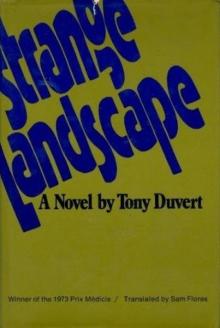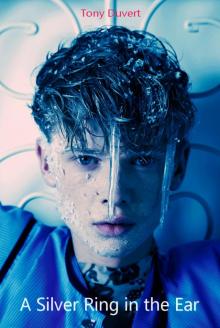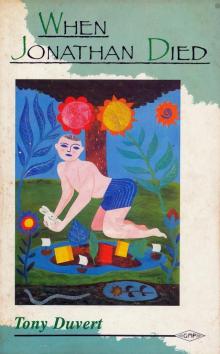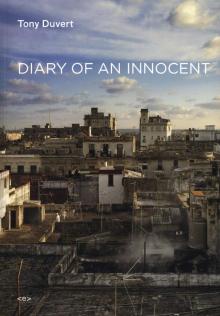- Home
- Tony Duvert
When Jonathan Died
When Jonathan Died Read online
…Two lads, that thought there was no more behind,
But such a day tomorrow as today,
And to be boy eternal.
W. Shakespeare, A Winter’s Tale
WHEN
JONATHAN
DIED
TONY DUVERT
translated by D. R. Roberts
Quand mourut Jonathan
©1978 Les Editions de Minuit
75006 Paris, France
English edition first published 1991
by GMP Publishers Ltd
P O Box 247, London N17 9QR
Translation world copyright ©1991
D R Roberts/Triangle Translations Ltd
British Library Cataloguing in Publication Data
Duvert, Tony
When Jonathan died.
I.Title
843.914 [F]
ISBN 0 85449 154 6
Distributed in North America by InBook
140 Commerce Street, East Haven CT 06512, USA
Distributed in Australia by Bulldog Books
P O Box 155, Broadway, NSW 2007, Australia
PART I
The little boy came into the kitchen, and he saw strange things on the floor.
But he said nothing. His mother was chatting to Jonathan. He, Serge, was going to explore this unknown house; he was unhappy at being neglected by the conversation.
A little later, his mother left without him. His eyes followed her. She went down a little track that led to the road; her car was down there. Jonathan shut the garden gate, pushed the child forward by the shoulders, and they went back into the kitchen. It was tea-time. Serge took a piece of bread and jam and a glass of milk. As he took a bite, the child pointed to Jonathan the strange things that were on the floor.
‘Why do you put those there?’
‘They’re for the mice,’ said Jonathan.
A saucer of milk, a saucer of jam and a big crust of bread. ‘Do they drink milk?’
‘They do.’
Serge listened with pleasure to Jonathan’s slight accent. An English, Dutch or German accent, you couldn’t tell. Jonathan had travelled too much, he no longer came from anywhere. Serge would have liked to imitate his voice; the words were calm and clear, a bit diffident, without shadows, like objects in a naive painting.
‘Do they have a tongue?’ Serge asked.
‘A tongue, yes. A little pink tongue that flicks about. They like doing that. They like jam too, this is raspberry, they leave the little raspberry seeds behind.’
‘I prefer it like that, like that, but apricot,’ said Serge, who seemed disappointed by this difference between his tea and the meal the mice would have. ‘But why do you give them food to eat?’
‘Because… well, I don’t know why.’
Serge ate his bread and butter from the middle. He took the buttered bread and ignored the crust, leaving a horseshoe behind.
‘I really like them,’ Jonathan went on. ‘They’re nice. Have you seen them?’ Serge shook his head. ‘They’ve got a long tail like that and it moves about, like your dog’s ears when he’s talking to you.’ (Serge said very quickly we haven’t a dog mother gave it away.) ‘No…? And paws like a cat or a squirrel, have you ever seen a squirrel?’ (Ah we’ve got a cat it’s a boy and it’s called Julie, said Serge), ‘and they’re soft to touch, really soft.’
‘You’ve touched one? It was my mother, calling it Julie, the cat, have you really touched a mouse?’
‘No, they’re too frightened. It was your mother who called the boy cat Julie?’
‘It was her, really; so you haven’t touched one?’
‘I have, but it was dead. I touched it, though. It was by the side of the bed.’
‘Do they come into the bedroom?’
‘They do, they come in the evening. That’s when they go for a walk and that’s when I really see them. Because I’ve got cake and biscuits and I put them on the bedside table.’
‘D’you give them cake?’
‘No, that’s for me, when I can’t sleep and I wake up, I get hungry.’
‘Are they boys or girls, the mice, tell me.’
‘Don’t be silly, they’re both.’
‘Ah… there are mice, and sometimes they’re boys.’
‘Yes.’
‘But can you tell they’re boys when you see them eating?’
‘No, you can’t tell. You have to catch them by the tali and you have to look just there.’
Jonathan pointed modestly with his finger towards the little boy’s shorts. Serge started to laugh:
‘Then it’s just like Julie, you can see her balls! You’ll have to give me a wash, I’m dirty now.’
It was a little over half a mile between the village and the house Jonathan had rented. The nicest thing about this landscape of coppice and meadow, dotted with farms, was the rough earth track which crossed it. At the far end there were hillsides bathed in light which fell down towards a shady river. You had to make your way through the hazel trees leaning out across the path; their catkins scattered pollen on the head and neck of anyone who passed.
Jonathan’s house was small, just as the village was small. It was surrounded by a ridiculous little garden: gardens are tiny in the country. And beyond the wire-netting fence where the bindweed curled Jonathan could see the calm and undulating expanse of the fields of bare earth, the trees, each made up of a thousand flashing lights all flickering in place, and the meadows of damp grass, their animation more gentle than that of the leaves above.
It was the beginning of June.
The house was doubtless one of an old group of farms. Close by, the only neighbouring house was like Jonathan’s, and though badly proportioned, it was more appealing in the simplicity of its decrepitude, and more dirty. It was occupied by an old peasant woman. There were, too, in the meadow, the ruins of a vast building, clear of grass or ivy; had it not been for the clumps of nettles which grew at their feet, thicker and higher than bracken, these walls, upright, yellow, worn and crumbling, might have risen in the midst of a blue desert sweltering under the sun.
A letter had told Jonathan that Barbara would visit with her son. He’d got to know them through a friend, eighteen months earlier. He’d kept company with them because of the boy. That was in Paris; Serge was six and a half then, Jonathan twenty-seven.
In their own way, the child and the man had loved each other very much. But Jonathan, discouraged by a thousand difficulties, had soon left Paris to take refuge in this corner of the country, though he hadn’t broken off relations with anyone.
Since then, he hadn’t talked, had rarely replied to letters, had no friends to visit, and his sexual life was reduced to solitary caresses accompanied by memories which were less so. He worked little, doing no more than a few drawings in ink or pencil. His gallery gave him a fair amount of money for them, but he had no use for it.
The idea of seeing Serge again overwhelmed him. Barbara would leave the child with him for a week to go on a trip to the south, and she would pick him up again when she returned. Free of a husband, she used to leave Serge here and there, as she enjoyed the life of a single girl. So when Jonathan had lived in Paris he looked after the boy, and they used to sleep together; in the morning, he would wash him, dress him and take him to school. Their friendship was so strange that Barbara was relieved when Jonathan went away. Serge, very quick-tempered before he knew Jonathan, was sweet-tempered with him, but only with him. After he’d left, he became passive and closed in on himself. That suited Barbara.
Jonathan wondered why she dared give the child into his care again. It seemed to be some kind of deal. Barbara was often short of money, and Jonathan, when he was able, would willingly help her out. Two months earlier, he’d made her a l
oan which wasn’t really a loan, because lending was something he wasn’t good at. Barbara had thanked him with two pages of gossip, in which the only special thing had been a passage about Serge; her other letters had never mentioned the child.
Jonathan had been intrigued by this unexpected gift. I hope you think of my lovely boy every now and again!!… He seems to have forgotten you completely!!!!… I talk to him about you — we were even going to see that exhibition of yours in December!… But no, the young man wasn’t interested… You know at their age they forget very quickly which is best don’t you think… But you can’t imagine how lovely he is now!!!!, Barbara had written, with her individual punctuation. She went on to say that Serge was at last behaving himself at school, that he loved her more and more, hid himself in her bed in the evening, a real little lover; he was getting to be a bit of a cry-baby, but so sweet. And really I do prefer that to when he went round breaking everything!!…Children!…
This wonderful news had driven Jonathan to despair.
As for the letter promising her son’s visit, it also mentioned the financial difficulties in which the mother found herself. The ploy was so outrageous that Jonathan was afraid Barbara would in the end arrive alone.
Serge had his hands wiped clean.
‘You weren’t dirty,’ said Jonathan.
‘No, I wasn’t dirty, it was a bit so you could wash me.’
In Paris, the child used to follow Jonathan into the shower, and would even have gone into the lavatory after him. ‘There isn’t a shower here, you know.’
‘Ah… why?’ said Serge. Then he turned his head away and his face took on that angry expression he used to have in his wild days.
‘Why did you go?’ he demanded.
‘…Last year?… I wanted to stay with you, you know,’ said Jonathan. ‘I should have stayed. I wasn’t brave enough. Your mother gets me down.’
‘Why did you go?’
Jonathan lived austerely. He didn’t have a lot of the things he needed for the child. He had few sheets, just one pillow and one pillow-case, one dishcloth. He washed them all himself. His few comforts were wine for his depressions, and a bedroom, every chink and crack blocked off, in which to suffer them. These days it needed bolts and blankets, a whole heap of obstacles to retain and to contain this life which ran away from him. After the child’s short visit, Jonathan would know an anguish from which he would never perhaps escape; he had less and less strength to fight against death.
He looked to see how much money he had and went to the village nearby to get the food, furnishings and other things he needed; he even made a journey to the nearest town. He hired a refrigerator. At the farms round about, he bought more food than he usually ate in two months. He got a mirror, too, and promised himself to break it afterwards. He looked at himself in it, examined his clothes, his hair, his hands, his face, and spent a long day getting them all in order.
He spring-cleaned the house, painted the garden fence, unscrewed the bolts from his bedroom door and tore down the rags which had been stuffed around the shutters. He put a clock in the kitchen, scoured the blackened saucepans, cleaned the tiles, the lavatory, the windows, found clean linen for the table and got some net curtains made up, found lamps, and put shades on the bare bulbs. There were games, toys, picture-books and medical supplies, and he meekly sought advice so as not to get them for the wrong age.
At the toy shop, he said he had a son. When he left the shop, his lie caused him such shame and unhappiness that he almost left the package behind on a bench.
Finally, he thought to himself: ‘If only he doesn’t come.’
They went upstairs to put Serge’s clothes away in the cupboard. The bed was large and high off the ground. It was the only bedroom in the house, which had just three rooms, including the kitchen. Close to the bed, on trestles, Jonathan had put the table where he worked. It was covered in large sketches, meticulously clean, and on the wood itself there were formless doodles.
‘It’s you that does those drawings?’ asked Serge.
‘Yes, me.’
‘Are they good?’
Jonathan smiled. ‘Do you think they’re good?’
‘My mother does drawings too. And paintings.’
‘Yes, I remember.’
‘But have you sold any? She hasn’t.’
‘It’s not easy.’
‘No. We go outside the cafés, you know, with Dominique, to the restaurants, we show them to people when they’re eating, but they haven’t got any money. Do you sell them like that, in restaurants?’
‘Uh… no,’ said Jonathan, a little embarrassed, ‘I don’t go out much in the evening, in Paris. But there are magazines and books, and then there’s a gallery, they send me money.’
‘A gallery?’
‘Well, a shop.’
‘So you don’t go out to work, you’re at home all the time?’ ‘Yes.’
‘Mummy works now.’
‘Yes, so she told me.’
‘At the office, in the afternoon. But not every day. Because she writes music and songs, she doesn’t write the notes, she sings the tune. It’s Jacques who writes the notes. But it’s her that makes it all up. Even the words. He’s got a guitar, he has. Do you know any of my mother’s songs?’
‘I don’t. She’s never sung anything for me.’
‘I know. She sings all wrong.’
‘Ah. But someone sings them?’
‘Well, no, nobody. She teaches me some, with Jacques, sometimes.’
‘I see. You’re lucky.’
‘Well, yes… not really.’
‘Oh well.’
‘But why don’t you do drawings like Mickey Mouse?’ Serge went on.
‘He seems to be… too… stupid. I prefer to draw cows. Would you like me to do a cow?’
They sat side by side in front of the drawing board, and Jonathan brought out a big sheet of paper.
‘Oh yes. No, a pig. And a big fat cow. And Donald Duck, you know Donald Duck, don’t you?’
Jonathan obeyed. Doing as Serge wanted didn’t embarrass him at all. His hand could do anything; and these clear and ironic images, the only ones the child’s eyes found legible, gave him the same pleasure as if he were a serial composer humming a schoolchildren’s song together with a child.
‘I can draw a cat, I can,’ said Serge. ‘I’m going to draw it here, first of all he’s laughing, only he doesn’t have any paws. What are you doing now?’
‘It’s an apple with lots of hair.’
‘There aren’t any. Are there really?’
‘There is one here. No, I’m doing you, Serge. Come on, look down again.’
And beneath the top of the head with its hair so delicately tangled, Jonathan sketched out Serge’s profile as he saw him sitting close, in a pencil line so fluent and so tender that he felt abashed by the beauty his hand produced despite himself. A skill which served no public purpose, but one he’d worked on stubbornly for years, because of his secret love for children’s faces. He would never have shown these portraits to anyone. His public work, which had gained him a reputation, was severe and very little concerned with figuration. The boy complained of not having an ear, then, when it was in place, Serge said:
‘Now, I’m going to draw you.’
He grabbed half a dozen coloured felt-tips and in red, blue, yellow and pink, he drew a boy holding a green flower in his hand, eyelashes radiant like stars and smiling from ear to ear, and with very long legs because he was a grown-up.
‘Is that me?’ said Jonathan softly. ‘I’m pretty.’
‘Yes, it’s you. ‘Cos you’ve got big legs. And there’s your pullover.’
Jonathan was surprised by the colour: a bright blue, with a red band across the chest. It was a year since last he’d worn it.
‘But that’s my old one, the one I had in Paris. I’ve still got it, you know. I’ll put it on again.’
‘Don’t bother,’ said Serge in a quiet, cold voice. And he spread brown al
l over his cat without paws.
For dinner, Jonathan had two little pigeons. First of all, they had to be plucked. Serge enjoyed doing it. The birds thrilled him. He returned to the abrupt gestures of other times as he stuffed the four wings into his pockets.
‘With all those wings, your trousers will fly away,’ said Jonathan.
‘I don’t care,’ he said, pushing his hands in deeper.
‘It’s getting cold. I’ll draw them and we’ll cook them in the fireplace, we’ll make a fire, eh?’
The fireplace was in the other room, Serge agreed to the fire. He wanted chips as well. In the fire, he burnt a handful of feathers, whose horrid smell made him contort his features. He got up all red and excited.
‘You’re waking up,’ said Jonathan, ‘you were dead this afternoon, with your mother.’
‘Is not true,’ replied Serge, ferociously. His face was fixed. He started to sulk, looking bad-tempered as he stared at the flames.
‘And I’m not hungry,’ he added, a moment later, looking closely at Jonathan.
‘Doesn’t matter, they can be eaten cold… You frighten me when you’re angry,’ Jonathan murmured, now bent over the fire himself. His voice trembled and he was ready to cry.
‘You mustn’t frighten me, Serge,’ he went on, ‘I can’t cope, I haven’t the strength, I really can’t, I’m going to go to bed. Why did you say that?’ The child looked at him, surprised.
‘We’ll eat,’ said Serge, intimidated, ‘Eh? We’ll eat then? Don’t go.’
‘The spit is too close, they’re going to burn. You see the juices dropping there, we’ll use that and baste them with the big spoon.’
‘I’ll do it.’
‘I’ll go and cut the chips.’
Jonathan went out to look for potatoes and a tea-towel, still new and stiff. He sat down on the ground near the fireplace, a shoulder against the boy’s arm. Serge, on his knees, was watching the juice which fell from the birds, his face bright with the heat.
‘Tomorrow I’ll go into the garden,’ he said.

 Strange Landscape
Strange Landscape A Silver Ring in the Ear
A Silver Ring in the Ear When Jonathan Died
When Jonathan Died Diary of an Innocent
Diary of an Innocent